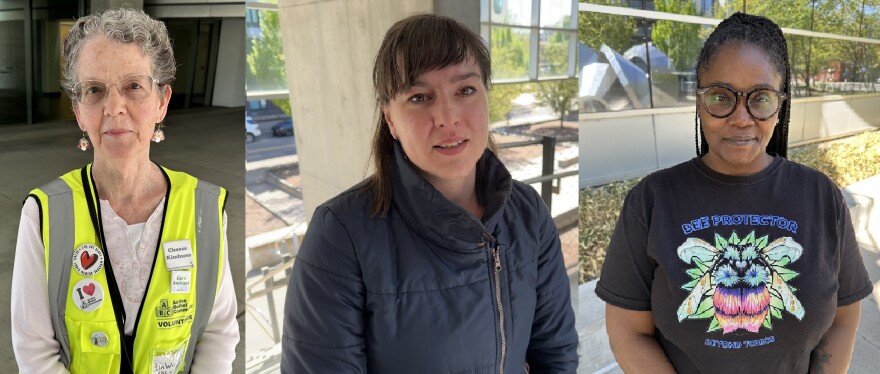The president of the J.H. Baxter wood products company was sentenced Tuesday in U.S. District Court in Eugene.
In January, Georgia Baxter-Krause pleaded guilty to violating the federal Clean Air Act and the Resource Conservation and Recovery Act, as well as making false statements to federal regulators. This follows years of complaints, probes, violations, and various state and federal fines surrounding the plant’s operations in the Bethel neighborhood.
Judge Michael McShane sentenced Baxter-Krause, age 62, to 90 days in jail. Her company was fined $1 million, and Baxter-Krause was fined $500,000.
Many local residents who came to see the sentencing ended up disappointed.
“I think she should have gotten a much longer sentence than 90 days," said Lin Woodrich with the group, Active Bethel Community. "And I would have liked to see her taken out of the courtroom with handcuffs.”
Locals near the J.H. Baxter plant in Eugene have long complained of odors and pollution, and they suspect emissions have seriously affected their health. Lisa Dion says her husband grew up in the shadow of the plant. She called the sentence against Baxter-Krause “weak.”
“She’s impacted a lot of people’s lives for the worst," said Dion. "She’s drastically altered my life. She’s made it a living hell for the last few years, because of my husband’s cancer diagnosis.”
Arjorie Arberry-Baribeault is with the environmental advocacy group, Beyond Toxics, which has long criticized the Baxter facility for years of violations and waste. Like Dion, she blames J.H. Baxter’s pollution for affecting her family.

“Maddening," she told KLCC outside the Wayne Morse Federal Courthouse. "We’re all mad. I’ve been impacted personally through my child. My child is a cancer survivor, she went through three years of cancer treatments because of the pollution from J.H. Baxter.”
McShane said the criminal case against Baxter-Krause couldn’t establish a causal link between Baxter plant emissions and locals’ health issues. But he said that could be determined through two civil lawsuits against J.H. Baxter.
Attorneys with the federal government said J.H. Baxter pumped nearly 2 million gallons of liquid process waste and released it illegally into the surrounding air throughout 2019. Daily logs showed between January and February of 2019, Baxter operators boiled off the hazardous wastewater in four of its five retorts on 136 known days.
Retorts are large cylinders that are sealed while containing lumber, to pressurize hazardous chemicals such as creosote, ammoniacal copper zinc arsenate, and pentachlorophenol into the wood to make them waterproof and resistant to insects.
The use of retorts to boil off wastewater was not permitted under the Resource Conservation and Recovery Act, and was also done without the knowledge or permission of state and local regulators. It’s led to four charges of environmental violations, and two counts of making false claims after Baxter-Krause lied to the federal government about the frequency and duration of these releases.
When asked about this use of the retorts, Baxter-Krause lied to regulators, according to federal officials. But investigators reviewed the Baxter plant’s maintenance logs and learned otherwise.
During her sentencing, Baxter-Krause apologized to the federal government, locals, and her family. At various times she said she was ashamed, that she should have been more honest with regulators, and that she accepted full responsibility for her actions.
McShane told Baxter-Krause that he wasn’t out to make her a bad person, but added that she was “an absent president” who had caused “great anguish and uncertainty.”
While her attorneys argued that her actions didn’t rise to the level of incarceration, McShane said there needed to be some accountability, reminding them that their client deliberately lied about the company's operations.
Baxter-Krause is being allowed to pay fine through a payment plan, with McShane noting that $815,000 was already paid toward the $1 million fine against the company. She will also receive one year of supervised release.
Copyright 2025, KLCC.



